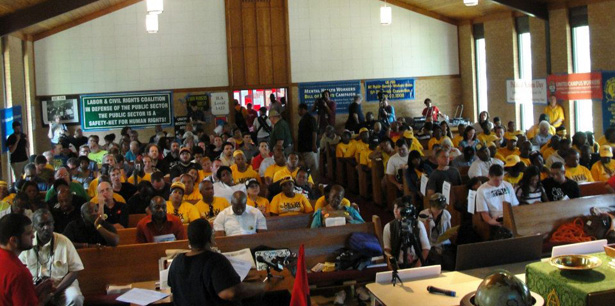In the Shadow of the DNC, Organizers Call for a Unionized South
http://www.inthesetimes.com/working/entry/13772/in_the_shadow_of_the_dnc_organizers_envision_a_unionized_south/

As the Democratic National Convention arrives in North Carolina, labor activists gathered to discuss how to organize the South. Bryan G. Pfeifer/Tumblr
The changeable letter board outside Charlotte, North Carolina’s Wedgewood Baptist Church, just a few miles south of where the Democratic National Convention will be held, read, “Yes, a liberal church.” But the meeting going on inside yesterday, sheltered from the sweltering heat, was somewhat further left-wing than the board suggested.
The thunderous baritone of Saladin Muhammad, coordinator of Southern International Worker Justice, enjoined the assembled congregants to start “a transformative movement that seeks to reorganize the economic, social and political relationships that determine the value of labor, the distribution of the wealth created by the labor, and the lives of people and helps to create sustainability.”
Organized under the banner Southern Workers Assembly, the group seeks to begin a wide-scale effort to organize labor in the South, the region of the United States most hostile to the efforts Muhammad described. So-called "right-to-work” laws, in place all over the American South, hamstring workers attempting to unionize and assert collective bargaining rights, and draconian laws implemented to intimidate and deport undocumented immigrants create an even more precarious class of workers whose labor can be exploited for profit more easily.
A common theme from different speakers held that this situation is not the product solely of recent developments, but rather the result of groundwork lain over decades. Ashaki Binta, a field organizer for the United Electrical, Radio and Machine Workers of America (UE), gave the assembly the lay of the land, touching on the 1947 Taft-Hartley Act, which prohibited many types of strikes and gave the White House broad authority to intervene in labor disputes, “to prevent the power of labor from being exercised.” The shift of the textile industry into Southern labor markets benefited capital greatly, Binta noted, by way of the obstacles to union strength thrown up by Taft-Hartley. That same legislation also meant the end of Operation Dixie, the previous attempt by radical trade unionists to organize the south.
